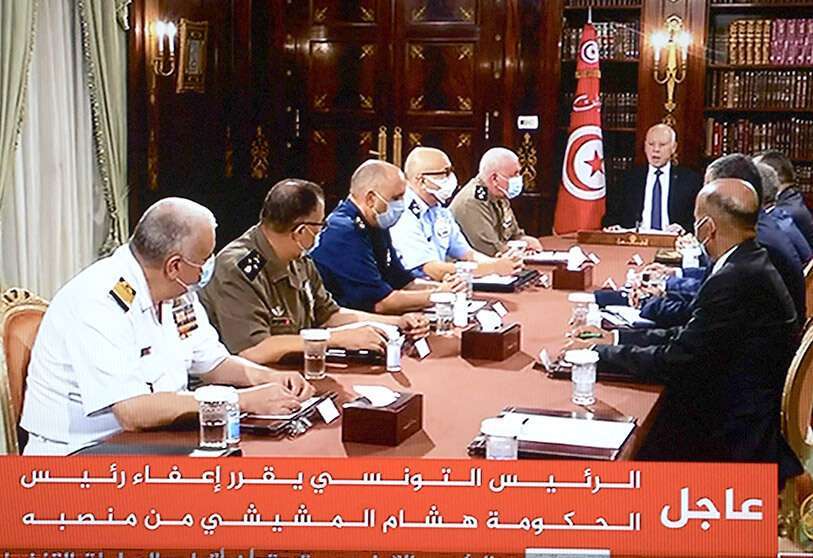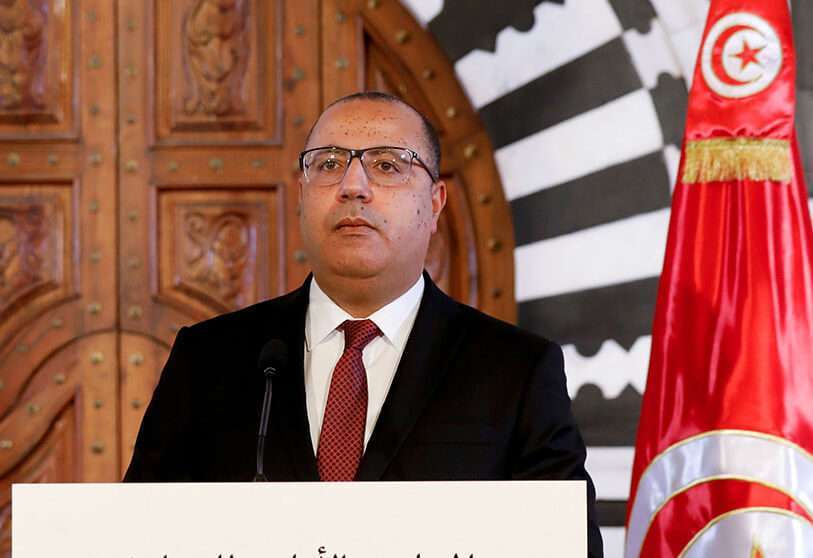Tunisian president assumes full governmental powers

The political crisis in Tunisia has exploded. Tunisian President Kais Saied, in the midst of the social, economic and health crisis the country is going through, has decided in his latest move to suspend parliamentary powers and assume full powers in what political entities in the country already consider a coup d'état. Similarly, Saied has dismissed the prime minister, Hichem Mechichi, with whom he had been waging a political battle since January, thus staging a political crisis unprecedented since the outbreak of the Arab Spring. In the last few hours, Tunisian police have seized the offices of Al Jazeera and expelled its journalists.
This decision comes after hundreds of demonstrators decided to take to the streets on the last day to protest against the Tunisian government, headed by Prime Minister Hichem Mechichi, to demand his resignation, as well as the dissolution of parliament and the reform of the political system. In addition to this, poor health management and the economic crisis the country is going through have been part of the triggers that have led the Tunisian population to take to the streets.

Following Saied's announcement on public television, thousands of people took to the streets to publicly show their support for the president. Alongside this, Saied himself joined his supporters on the streets to celebrate his decision to freeze parliament and dissolve the government. The marches were authorised by the police despite the curfew that Tunisia maintains from 8 p.m. to 5 a.m. as an exceptional measure to curb the spread of the COVID-19 pandemic.
In this sense, Tunisia is going through a "catastrophic" health situation, as the Tunisian government described it, following the spike in cases that has led to the highest number of infections since the start of the pandemic. Following this announcement, Morocco and the United Arab Emirates sent "urgent" health aid to help resolve the health and epidemiological situation in the country.

This complicated health situation has led to the dismissal of Health Minister Faouzi Mahdi, who was dismissed a day before launching a vaccination campaign that was described as "anarchic", according to state news agency TAP.
On the other hand, the Ennahda party has taken issue with the stance adopted by the president after parliamentary speaker Rached Ghannouchi accused President Saied of "annulling the revolution and the constitution" and defended "that the institutions remain in place, and the supporters of Ennahda and the Tunisian people will defend the revolution". In this vein, Ghannouchi has organised protests in front of parliament and called on his supporters to join him in demonstrating against the president's decisions after the first party in parliament called the situation a "coup d'état".

Likewise, the Attayar (Democratic Current) party and part of the Democratic Bloc has stated that it "disagrees with President Saied's interpretation of Article 80 of the Constitution and rejects decisions and procedures that derive from outside the constitution". Alongside this, the spokesman for the Turkish president, Ibrahim Kalin, said in a tweet that they reject "the suspension of the democratic process and the disregard of the democratic will of the people in friendly and brotherly Tunisia. We condemn initiatives without constitutional legitimacy and popular support".
Political rivalries have been so evident that the Tunisian army has prevented Rached Ghannouchi from entering the parliament building in the heart of the Tunisian capital.

In this vein, the cities of Gafsa, Sidi Bouzid, Monastir and Nabeu staged a day of mass protests that reflected the general weariness of the Tunisian population in the face of the crisis. In the city of Sousse itself, on Tunisia's east coast, protesters tried to storm the headquarters of the Ennahda party, the political formation that is most fiercely opposed to the precepts of Islam. In this vein, some analysts link the political formation to the Muslim Brotherhood organisation, which is considered a terrorist organisation by countries such as Egypt and the United States.

In a presidential statement, the president added that "we did not want to resort to measures despite the fulfilment of constitutional conditions, but on the other hand, many people were deceived by hypocrisy and betrayal". Alongside this, the president has warned those who decide to take up arms and shoot at the armed forces: "They will be answered with bullets".
Kais Saied, elected in 2019 with 70% of the votes as President of the Republic, has decided to apply Article 80 of the Tunisian Constitution, i.e. to freeze "all his actions" in case of "imminent danger", in view of the constitutional character that prevents the dissolution of Parliament. Article 80 stipulates that "in the event of an imminent threat that endangers the nation's entity, national security or independence and prevents the normal institutional functioning of the state, the President of the Republic may adopt the measures required by this state of emergency".

The fragile political situation in the country as a result of the political pacts between parliamentary groups in the absence of a political party with a parliamentary majority, together with the differences between the executive and the president of the Republic, meant that the Tunisian political system could no longer be sustained.
Tunisians' weariness with the country's complicated situation is evident and has been echoed in the country's streets. This chaotic situation could be an opportunity for the president to consolidate his power in a context that demands security and stability. However, the success of his decision will depend to a large extent on the stance of both national and international political actors in the region, as his own role has been key in preventing the country from openly declaring bankruptcy and sustaining a democracy that has proven to be in a constant state of fragility until it finally collapses.









